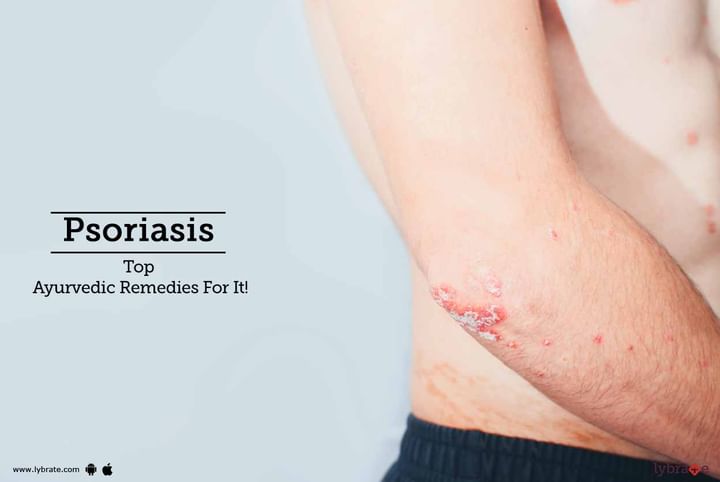Psoriasis - Top Ayurvedic Remedies For It!
Psoriasis is a Noncontagious, chronic skin condition that produces plaques of thickened, scaling skin. The dry flakes of skin scales result from the excessively rapid proliferation of skin cells. The proliferation of skin cells is triggered by inflammatory chemicals produced by specialized white blood cells called lymphocytes. Psoriasis commonly affects the skin of the elbows, knees, and scalp.
The spectrum of disease ranges from mild with limited involvement of small areas of skin to large, thick plaques to red inflamed skin affecting the entire body surface.
Psoriasis is considered an incurable, long-term (chronic) inflammatory skin condition. It has a variable course, periodically improving and worsening. It is not unusual for psoriasis to spontaneously clear for years and stay in remission. Many people note a worsening of their symptoms in the colder winter months.
Psoriasis affects all races and both sexes. Although psoriasis can be seen in people of any age, from babies to seniors, most commonly patients are first diagnosed in their early adult years. The quality of life of patients with psoriasis is often diminished because of the appearance of their skin. Recently, it has become clear that people with psoriasis are more likely to have diabetes, high blood lipids, cardiovascular disease, and a variety of other inflammatory diseases. This may reflect an inability to control inflammation. Caring for psoriasis takes medical teamwork.
The 5 types of psoriasis and most common symptoms include:
Plaque psoriasis: This is the most common type of psoriasis — about 80 percent of people with the condition have plaque psoriasis. It causes red, inflamed patches that cover areas of the skin. These patches are often covered with whitish-silver scales or plaques. These plaques are commonly found on the elbows, knees, and scalp.
Guttate psoriasis: Guttate psoriasis is common in childhood. This type of psoriasis causes small pink spots. The most common sites for guttate psoriasis include the torso, arms, and legs. These spots are rarely thick or raised like plaque psoriasis.
Pustular psoriasis: Pustular psoriasis is more common in adults. It causes white, pus-filled blisters and broad areas of red, inflamed skin. Pustular psoriasis is typically localized to smaller areas of the body, such as the hands or feet, but it can be widespread.
Inverse psoriasis: Inverse psoriasis causes bright areas of red, shiny, inflamed skin. Patches of inverse psoriasis develop under armpits or breasts, in the groin, or around skinfolds in the genitals.
Erythrodermic psoriasis: This type of psoriasis often covers large sections of the body at once and is very rare. The skin almost appears sunburned. Scales that develop often slough off in large sections or sheets. It’s not uncommon for a person with this type of psoriasis to run a fever or become very ill.
Symptoms:
Psoriasis symptoms differ from person to person and depend on the type of psoriasis. Areas of psoriasis can be as small as a few flakes on the scalp or elbow, or cover the majority of the body.
The most common symptoms of plaque psoriasis include:
-
red, raised, inflamed patches of skin
-
silver-white scales or plaques on the red patches
-
dry skin that may crack and bleed
-
soreness around patches
-
itching and burning sensations around patches
-
thick, pitted nails
-
painful, swollen joints
Not every person will experience all of these symptoms. Some people will experience entirely different symptoms if they have a less common type of psoriasis.
Most people with psoriasis go through “cycles” of symptoms. The condition may cause severe symptoms for a few days or weeks, and then the symptoms may clear up and be almost unnoticeable. Then, in a few weeks or if made worse by a common psoriasis trigger, the condition may flare up again. Sometimes, symptoms of psoriasis disappear completely.
When you have no active signs of the condition, you may be in “remission.” That doesn’t mean psoriasis won’t come back, but for now you are symptom free.
Causes:
Scientists are unclear as to what causes psoriasis. However, thanks to decades of research, they have a general idea of two key factors: genetics and the immune system.
Immune system
Psoriasis is an autoimmune condition. Autoimmune conditions are the result of the body attacking itself. In the case of psoriasis, white blood cells known as T cells attack the skin cells mistakenly.
In a typical body, white blood cells are deployed to attack and destroy invading bacteria and fight infections. The mistaken attack causes the skin cell production process to go into overdrive. The sped-up skin cell production causes new skin cells to develop too quickly. They are pushed to the skin’s surface, where they pile up.
This results in the plaques that are most commonly associated with psoriasis. The attacks on the skin cells also cause red, inflamed areas of skin to develop.
Investigation Done:
-
CBC(Complete Blood Count)
-
LFT(Liver Function Test)
-
KFT(Kidney Function Test)
-
Sr. Uric Acid
An investigation was done to rule out any other pathology. Investigation were within normal limit.
Treatment & Dosage:
- Tablet Salin- one or two tablet two times or three times a day
- Salin Syrup - one or two tea Spoon two times or three times a day
- Tablet Daa - one or two tablet two times or three times a day
- Immunosun Capsule - one or two tablet two times or three times a day
- Nimbamrutadi Kasayam - two tea Spoon two times or three times a day with water
- Triflanimbadi Kasayam - two tea Spoon two times or three times a day with water
- Sunthiyadi Kasayam - two tea Spoon two times or three times a day with water
- Manjisthadi kasayam - two tea Spoon two times or three times a day with water
- Arogyavardgini vati - one or two tablet two times or three times a day
- Krumina Syrup - one or two tea Spoon two times or three times a day
- Krumina Tablet - one or two tablet two times or three times a day
- Mansi Syrup - one or two tea Spoon two times or three times a day
- Antress Tablet- one or two tablet two times or three times a day
In Psoriatic Arthritic Conditions:
- Tablet Itis
- Tablet Healbo
- Tablet Suvarna sallaki RA
- Tablet Ashwasallaki RA
- Vatari kasaym
- Kachnar Kasayam
External Medicines
- Dermosun Ointment – Apply on effected part / whole body twice a days
- Salin Oil - Apply on effected part / whole body twice a days
- Ternim Cream - Apply on effected part / whole body twice a days
- Psorasun Oinment - Apply on effected part / whole body twice a days
Panchkarma
This is an effective treatment for all types of psoriasis.
This special Ayurvedic treatment programme applies for 8 to 28 days.
This programme includes special Lapanam, Abhyangam, Snehapanam, Pizhichil, Takradhara, Nimbambmrutatadi, Sarvangdhara, Virechana & Basti Karma.
Result & Discussion: Psoriasis is a disease with unknown etiology and triggered by many factors. In modern science, treatment of psoriasis is a challenge. They do not have any safe and proper medicine for psoriasis. But, Ayurveda treatment gives satisfactory results as well as the quality life to the patients. Ayurveda removes toxin out of the body and corrects the formation of aama. Ayurveda gives the prevention as well as the treatment. So, by following the dietary and lifestyle change we prevent the reoccurrence of the disease.
In case you have a concern or query you can always consult an expert & get answers to your questions!



+1.svg)
